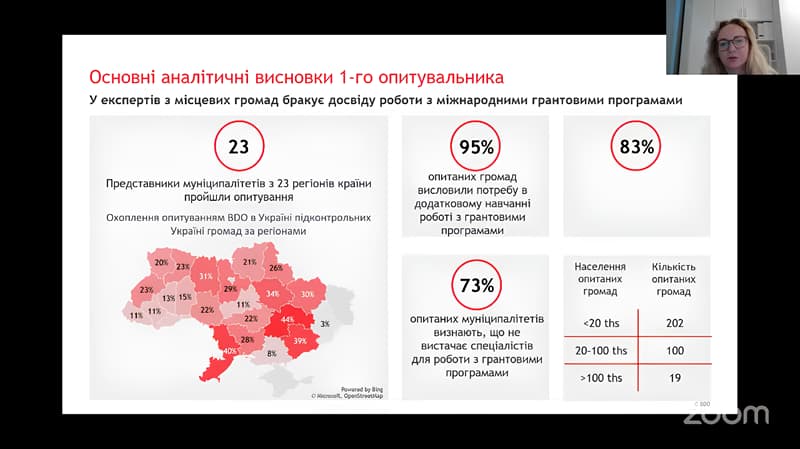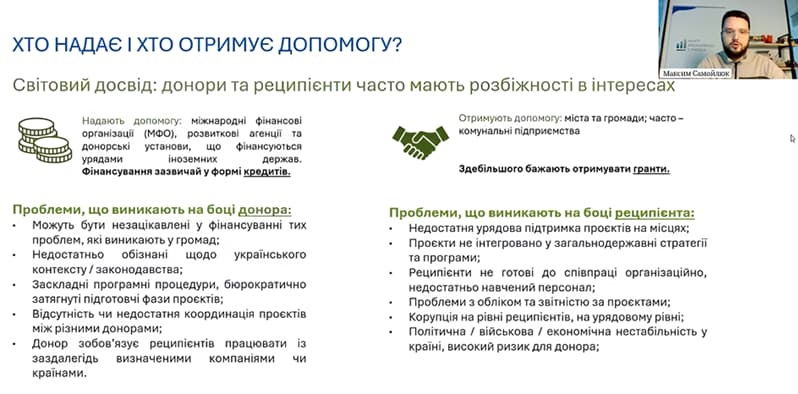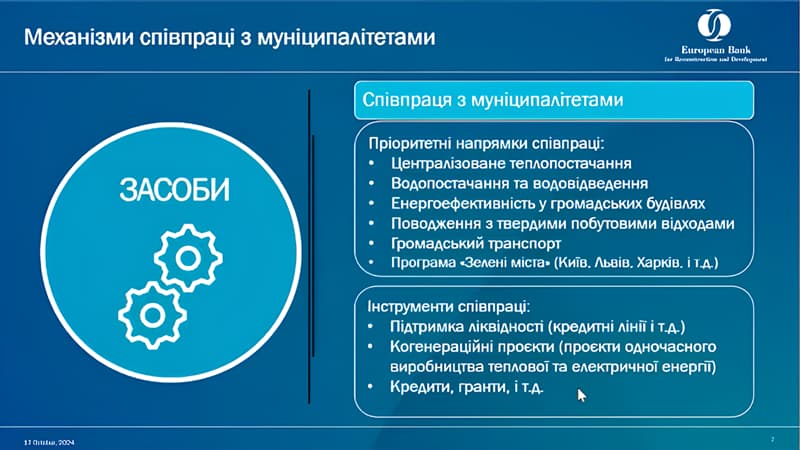On October 17, 2024, a public discussion “Absorptive capacity of municipalities: how to effectively attract and allocate resources for recovery” was hosted by the Institute for Analysis and Advocacy. The event united representatives from local communities, businesses, and international partners to discuss the current challenges and opportunities that Ukrainian communities face during their recovery and development process.
Anna Kornyliuk, Policy and Data Analyst at the Institute for Analysis and Advocacy, opened the discussion. She highlighted that absorptive capacity refers to a municipalities’s ability to attract and efficiently utilize resources for sustainable development. She particularly emphasized the challenges communities face due to the ongoing war:
“The challenges faced by Ukrainian communities extend beyond just a lack of funds. There is also a crucial need to strengthen management capacity and introduce new practices for collaborating with donors and businesses,” — emphasized Anna Kornyliuk.
Vira Savchenko, Executive Director of BDO in Ukraine and Co-Chair of Ukraine Recovery Committee at European Business Association, unveiled the results of a BDO in Ukraine study on the needs of Ukrainian communities in their recovery and sustainable development efforts. She stressed: “We cannot consider Ukraine’s recovery separately from its integration into the EU. This is a unified process that requires a comprehensive approach and coordination at all levels.”.
The study findings revealed that:
Ms Vira emphasized the importance of providing financial support for communities, noting that access to investment, grants, and government subsidies is critical to implement projects aimed at restoring infrastructure. Without adequate funding, communities will not be able to effectively overcome the challenges they face on the path to recovery.

Vira Savchenko also presented a free guide “Peculiarities of Participation in Tenders of Electronic Procurement Systems at the expense of the State Budget of Ukraine and Funds of Donor Organizations”, created by BDO in Ukraine. This guide will serve as a valuable tool for communities, helping them better understand the processes of participating in tenders and utilizing financial resources from both the state and international donors. The guide contains practical recommendations on submitting applications, requirements for tender participants, and useful tips on managing projects funded by the state and donors. With this guide, communities will be able to participate more confidently in tender procedures, attract additional resources, and contribute to the development of their territories.
“In today’s rapidly changing world, communities must be agile and prepared to face new challenges. Integrating recovery efforts with long-term sustainable development plans is crucial for ensuring a sustainable future. The absorptive capacity of communities is a vital component of Ukraine’s recovery process. It’s essential to utilize resources not only for rebuilding infrastructure but also for fostering long-term sustainable development,” — said Savchenko.
Next, the participants discussed the experience of cooperation between communities, donors and business. Maksym Samoiliuk, economist at the Center for Economic Strategy, said:
“Often, international partners have their own priorities, which do not always coincide with the real needs of communities. This creates additional difficulties in attracting effective assistance.”
Using the example of his research, Mr. Maksym showed that only 6 out of 15 projects, implemented in Ukrainian communities before the full-scale invasion, were successful. The main reasons for the failures were bureaucratic obstacles and lack of quality coordination with donors.

Mykhailyna Skoryk-Shkarivska, founder of the Institute for Sustainable Development of Communities, shared examples of successful practices of resource management at the local level. She discussed the importance of local leaders’ initiative in the recovery process and added:
“Working with donors requires not only planning but also clear coordination between the strategic and operational levels. Unfortunately, many municipalities are not yet ready for such cooperation.”
Illia Borovynskyi, EBRD Manager, discussed the role of international financial institutions in supporting Ukrainian communities and the mechanisms of cooperation with them. Mr. Illia emphasized:
“Communities should seize the opportunity at the international forums and discussions to present their projects, find new partners, and attract additional resources.”

The discussion resulted in outlining the next steps to increase the absorptive capacity of communities:
Concluding the event, the absorptive capacity of municipalities is a critical factor for sustainable development and recovery of Ukraine. Effective resource mobilization depends on coordination between local authorities, businesses, and international partners.
Key takeaways from the event participants:
“The success of the recovery depends on the readiness of communities to cooperate and implement modern management approaches,” — Vira Savchenko summarized.
Paying attention to the challenges and opportunities faced by the communities, BDO in Ukraine develops customized strategies aimed at sustainable development and regional recovery. We offer comprehensive services of the development of investment projects that can attract donor funds and other resources to support local initiatives. If your community needs support in implementing sustainable development projects, don’t hesitate to contact us. BDO in Ukraine is ready to help you create a solid foundation for the future of your community.
- Lack of financial resources and insufficient training of personnel.
- Challenges in finding and using donor funding.
- Insufficient level of management competencies and lack of specialists to work with grants.
- Low integration of modern IT solutions: only 2% of municipalities have integrated digital technologies into their management.
“The challenges faced by Ukrainian communities extend beyond just a lack of funds. There is also a crucial need to strengthen management capacity and introduce new practices for collaborating with donors and businesses,” — emphasized Anna Kornyliuk.
Research presentation on the reconstruction needs of Ukrainian municipalities: importance of training and partnership for community development
Vira Savchenko, Executive Director of BDO in Ukraine and Co-Chair of Ukraine Recovery Committee at European Business Association, unveiled the results of a BDO in Ukraine study on the needs of Ukrainian communities in their recovery and sustainable development efforts. She stressed: “We cannot consider Ukraine’s recovery separately from its integration into the EU. This is a unified process that requires a comprehensive approach and coordination at all levels.”.The study findings revealed that:
- 95% of communities require additional training on how to work with grant programmes.
- 73% of communities reported a lack of experts in writing applications.
- 83% of communities choose not to use consultants to work with grants, relying only on internal resources.
Ms Vira emphasized the importance of providing financial support for communities, noting that access to investment, grants, and government subsidies is critical to implement projects aimed at restoring infrastructure. Without adequate funding, communities will not be able to effectively overcome the challenges they face on the path to recovery.

Vira Savchenko also presented a free guide “Peculiarities of Participation in Tenders of Electronic Procurement Systems at the expense of the State Budget of Ukraine and Funds of Donor Organizations”, created by BDO in Ukraine. This guide will serve as a valuable tool for communities, helping them better understand the processes of participating in tenders and utilizing financial resources from both the state and international donors. The guide contains practical recommendations on submitting applications, requirements for tender participants, and useful tips on managing projects funded by the state and donors. With this guide, communities will be able to participate more confidently in tender procedures, attract additional resources, and contribute to the development of their territories.
“In today’s rapidly changing world, communities must be agile and prepared to face new challenges. Integrating recovery efforts with long-term sustainable development plans is crucial for ensuring a sustainable future. The absorptive capacity of communities is a vital component of Ukraine’s recovery process. It’s essential to utilize resources not only for rebuilding infrastructure but also for fostering long-term sustainable development,” — said Savchenko.
Experience sharing: donors, municipalities and business
Next, the participants discussed the experience of cooperation between communities, donors and business. Maksym Samoiliuk, economist at the Center for Economic Strategy, said:“Often, international partners have their own priorities, which do not always coincide with the real needs of communities. This creates additional difficulties in attracting effective assistance.”
Using the example of his research, Mr. Maksym showed that only 6 out of 15 projects, implemented in Ukrainian communities before the full-scale invasion, were successful. The main reasons for the failures were bureaucratic obstacles and lack of quality coordination with donors.

Mykhailyna Skoryk-Shkarivska, founder of the Institute for Sustainable Development of Communities, shared examples of successful practices of resource management at the local level. She discussed the importance of local leaders’ initiative in the recovery process and added:
“Working with donors requires not only planning but also clear coordination between the strategic and operational levels. Unfortunately, many municipalities are not yet ready for such cooperation.”
Illia Borovynskyi, EBRD Manager, discussed the role of international financial institutions in supporting Ukrainian communities and the mechanisms of cooperation with them. Mr. Illia emphasized:
“Communities should seize the opportunity at the international forums and discussions to present their projects, find new partners, and attract additional resources.”

The discussion resulted in outlining the next steps to increase the absorptive capacity of communities:
- Engaging young people and students through internship programs and community-based practices.
- Development of cross-sectoral partnerships: cooperation between local authorities, businesses, and public organizations.
- Improving digital infrastructure to automate data management and analysis processes.
- Participation in international events and forums to establish relationships with donors and investors.
Concluding the event, the absorptive capacity of municipalities is a critical factor for sustainable development and recovery of Ukraine. Effective resource mobilization depends on coordination between local authorities, businesses, and international partners.
Key takeaways from the event participants:
- Training and competencies development will enable municipalities to work more effectively with grants.
- Partnerships at the local and international levels will help attract investment and resources.
- Transparent management mechanisms are the key to gaining trust of donors and investors.
“The success of the recovery depends on the readiness of communities to cooperate and implement modern management approaches,” — Vira Savchenko summarized.
Paying attention to the challenges and opportunities faced by the communities, BDO in Ukraine develops customized strategies aimed at sustainable development and regional recovery. We offer comprehensive services of the development of investment projects that can attract donor funds and other resources to support local initiatives. If your community needs support in implementing sustainable development projects, don’t hesitate to contact us. BDO in Ukraine is ready to help you create a solid foundation for the future of your community.


